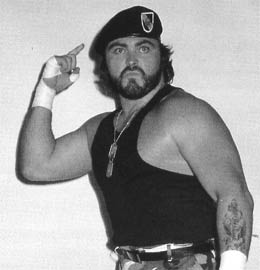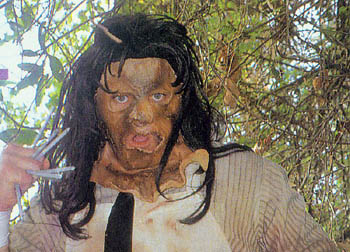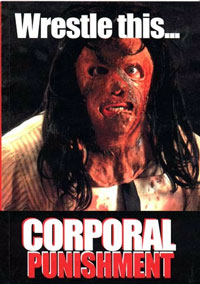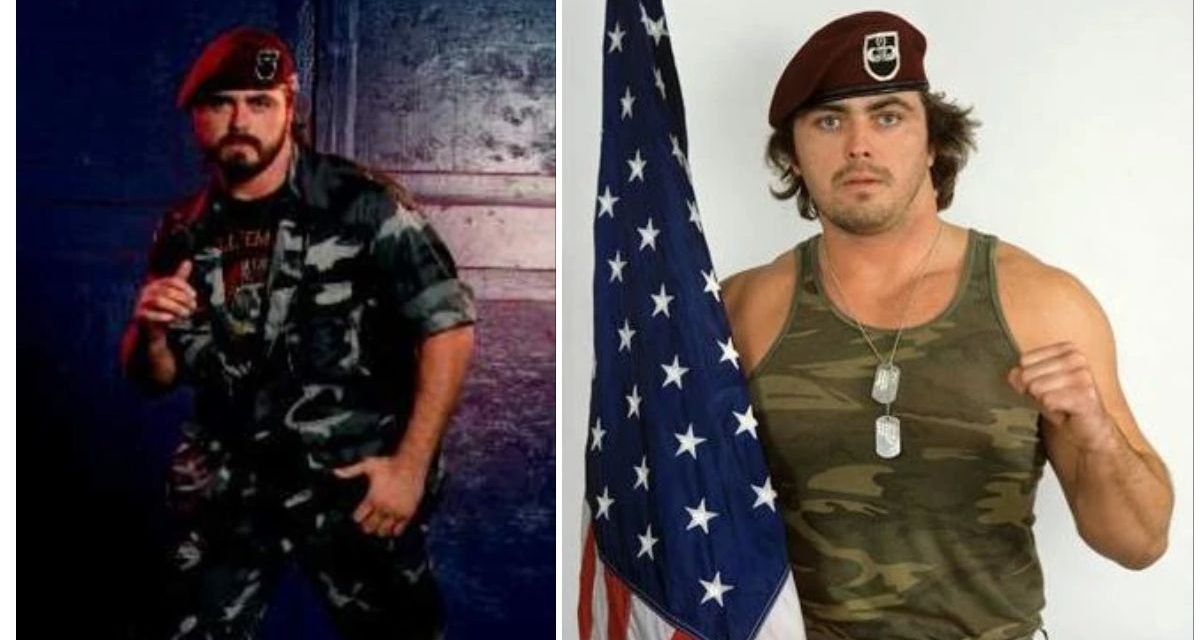Mike Kirchner is in the mood to set things straight. Besides the WWE.com news bit from last week that he had left this mortal plain, he also is a little discouraged by some of his epitaphs. For one, he insists he did not leave the WWF on bad terms in 1987.
He had been with the company more than a year, working as Corporal Kirchner in a series of heated matches with Nikolai Volkoff and the Iron Sheik. But the schedule was a killer, with up to six weeks straight on the road, without a day off, in a different city every day.

Corporal Kirchner
It wasn’t exactly what he dreamed life as a pro wrestler would be, and the pressure was starting to mount.
“When I left back then in ’87, I was going through divorce, personal problems, the cost of success. It’s just everybody wanted everything at the same time,” Kirchner told SLAM! Wrestling. “My wife’s lawyers were going, ‘Well, you should have a 20-year career, and you should make this much money, for a lump-sum alimony.'”
The drug scene was bad back then as well, he admits. “I had my drawbacks, I got suspended for drug use up in Canada, it was right outside Toronto. Me and six other wrestlers were suspended that night for testing positive for drugs.”
At the time, Vince McMahon was adamant about testing for recreational drugs, and Kirchner was caught, and suspended for six weeks.
“When it came time for me to go back to work, I’d had six weeks to think about whether I wanted to return there,” he explained. “I just called up and said, ‘I don’t think I’m coming back.’ They said, ‘Okay.’ That’s how I left. There were never any bad words, there was never any firing, there was no altercation. I was at home and it was just a phone call, and I told them, ‘I’m not coming back.'”
In essence, it was a life re-evaluation. “I just decided that if this is what success is all about, I took a step back from it and decided that I wanted to go Japan,” he said. “I went up to Calgary, working for Stu Hart for a little while. Then I went over to do a stint with Billy Jack [Haynes] when he had Oregon Wrestling there for a few months. After that, I never worked in the States again. I spent 10 years in Japan.”
Born Michael Penzel in Chicago, he went to high school in Fort Lauderdale, Fl. Kirchner confesses that he didn’t have a lot of experience to get into the position that he did with the WWF. He met Terry Bollea, aka Hulk Hogan, training in a gym in 1982, and had done a bit of training in Florida. “It was just a strong desire to be a pro wrestler,” he said. “‘God, I would love to do this, this is a job where you travel the world.’ The fame, the fortune. But you hear how hard it is to get into. It’s like being in a rock band, you’ve got to have the walk, the heart, the desire and, hopefully, some desire to get you by to do it.”
The WWF decided that another patriot was needed to stand up for Americans every way, after Sgt. Slaughter (Bob Remus) left the company. Kirchner was never portrayed as Slaughter’s protégé, the way Don Kernodle, Jim Nelson were in the Mid-Atlantic territory, and Greg Gagne was, forgetably, in the AWA. “We never tagged, we never had words, or anything like that,” said Kirchner. “He went to do his thing with GI Joe, and they needed another military body. You know how gimmicks go. Vince said, ‘We need a new gimmick, here you go’ and gave me the ball. He gives you the opportunity, take advantage of it. That’s exactly what it was, an opportunity.”
Nikolai Volkoff got the job of schooling Kirchner, and worked more than a hundred matches with him. “He was a good guy,” said the hated Russian. Kirchner was green, though, but “he was learning quick.”
“With the Sheik and Volkoff, that was a hell of a run with those two,” said Kirchner. “Great paydays. Just wrestling them, the angle was there before you had to do anything or set up a match. There’s USA and Russia, and the Iran thing, so there was always natural heat and that was a beautiful thing. They weren’t the most spectacular, glorious, scientific wrestling matches, but they were good angle matches.”
After his suspension, and subsequent decision to leave the WWF, Kirchner went to Calgary’s Stampede Wrestling.
“I loved Calgary, the city itself, and working with Stu Hart was great. What was nice was the talent that we had there at the time,” he said, listing off Chris Benoit, Owen Hart, Hiro Hase, Brian Pillman, Johnny Smith, Barry Orton and Phil Lafleur. “It was a good crew. It was a nice change of pace, smaller territory. It was almost a time off. The money wasn’t the same, but like I said, I really enjoyed being up there and working for Stu. He was a great guy. I used to go over to his house every Sunday and have dinner with him. There was always an open invite.”
The trips, like the WWF, weren’t the easiest, however. “You might drive all day to get to a small arena, and there might be 50 people there. It was a good experience, something I really enjoyed.”
Going to Calgary introduced him to Japanese wrestlers like Hase and Shinya Hashimoto. Soon, he was on the way to the Land of the Rising Sun himself, just not as any of his previous guises.

Kirchner as Leatherface Photo courtesy Mike Lano, WReaLano@aol.com
Instead, inspired by the 1974 movie, The Texas Chainsaw Massacre, he was Leatherface, and then Super Leather.
“It was a good idea. When the movie came out, in its time, back in ’72, it was a terrifying movie just because it was so brutal. Shock value now, it’s not that, but back in the day, here’s a brutal movie,” Kirchner said. “So working on that character with the chainsaw was a shock appeal in itself. You’re like a circus freak, but a dangerous circus freak. So anybody who got in the ring with you, it’s like, ‘Wow, he’s got to fight Super Leather. I hope he doesn’t get hurt too bad.'”
Wearing a rubber mask and a loose-fitting outfit, he was expected to up the hardcore to gory new levels.
“It was my character. Super Leather was that character. For Japanese people, and for me at that time, hardcore stuff was just, I don’t know, I would say it was sadistic. It’s what was expected of you,” he said. “You’re never going to be a fan favourite. They wanted you to do horrible things. I could go out there and hit them with every spectacular wrestling move and they wouldn’t care. I bring out a nail brush and brutalize somebody with it, and they they’d just be in awe. ‘Did you see what he did? He’s a monster.’ So I became, I don’t know, more of a horror figure than a wrestler.”
He would do more than 60 tours of Japan, four weeks at a time, and get to see other locales like China, Korea and Guam. “They were paying me really good for being really bad,” Kirchner said. “I had people jump off balconies to get away from me, because I would come out through the crowd. My character could be that terrifying. Kids going into epileptic seizures. Stampeding arenas. That character was super pumped up. They don’t have the liability issue that I had in the States or anything here.”
In his book Have A Nice Day, Mick Foley wrote about Kirchner. “Mike Kirchner had been the original Leatherface, for the FMW promotion in Japan. He had a short run in the World Wrestling Federation as Corporal Kirchner in the mid-eighties, but their attempt at making him a new Sergeant Slaughter had failed, and he had been drifting in the business for years before catching on in Japan. He was a nice guy, but he had a short fuse, and two years earlier an argument that he had not started ended with him punching a Japanese man in the face. The punch had been so devastating that the man’s face had almost been destroyed, and Kirchner spent six months in a Japanese jail as a result.”
Like his “death” and his drug suspension and WWF departure, Kirchner doesn’t shy away from the details of what happened in Japan that fateful night either. “That was years ago. We were in Roppongi, which is a section of Tokyo with a lot of night clubs and stuff. I was with some of the wrestlers. One of the guys said something to a guy with a girl. He came up behind us and said, ‘You guys go back to America, leave back to America.’ We pushed him out of the way, just ‘get out of here,’ because we were walking around. He kept persisting. I turned around and, bad judgment, I just hit him one time in the jaw. I knocked him out. I just set him against the building and we just kept walking. I thought nothing of it. That’s what happened there. So I did four months in a Japanese prison for bad judgment, a $10,000 fine, and I got banned for a year. But after my year, I came back as Super Leather, instead of Leatherface, and I was more popular than ever.”
From the sounds of it, the jail time was harder on his mother, Jean, than it was for Kirchner. She found it therapeutic to write about her son, and the end result was the fictional account of his life, Wrestle This … Corporal Punishment, composed under the name Genevieve O’Callaghan.
“I started [the book] when he was in Japan, when they arrested him in Japan. It was rather cathartic for me to put it down, and work my way through his being there, because he was looking at 10 years over there, which would have been very hard,” Jean Kirchner said.

“It was something that I’d say that my mother did for my mother,” Mike said about the book. “If I was to write it, I mean, it was based on me. I suppose it’s my mother’s view of my ex-life, or how I used my judgment, where other people go, ‘I wouldn’t have done that’ or ‘I wonder why he did that.’ So it’s her outside looking in.”
“He laughingly calls it my version. Really, I didn’t have all the facts and all everything like that. I thought I’m not going to offend anyone, I’m not going to say this one did this, and this one said that. I just basically took his outline as a sketch and filled in the blanks. It was a fun project,” said Jean.
In the end, Kirchner will be remembered for more than just his mother’s book. Though he retired in 1999 at the age of 42, and is now driving a truck, Kirchner was a major player in two different promotions with two vastly different characters. “It’s a combination there too. You shoot an angle or you’ve got a good gimmick, you want it to be just that — a good gimmick in the entertainment industry,” he said. “The Corporal was super patriotic. Following in after Slaughter was a hard gig, but eventually I got it over, and I liked that character a lot. But Super Leather, I worked just as hard, and I got that character over lots. I never seemed to be caught in the middle — ‘He’s alright, or he sucks. That character didn’t matter.’ I got both characters over. I see the fans, ‘The Corporal? Oh, I remember him.’ ‘You remember Super Leather?’ ‘Oh yeah, I remember Super Leather.’ I can consider that successful as your characters go.”
RELATED LINKS
- Dec. 23, 2021: Cpl. Kirchner dead at 64
- Oct. 21, 2006: Cpl. Kirchner speaks: “I’m not dead!”
Greg Oliver would like to thank all his teachers in the journalism program at Ryerson University, and his various mentors at the Toronto Sun and Kitchener-Waterloo Record for sharing their time and skills in the development of this journalist. To steal a line from his friend, Les Thatcher, train hard and master your craft; it applies to writing as well as it does pro wrestling. Greg can be emailed at goliver845@gmail.com.

